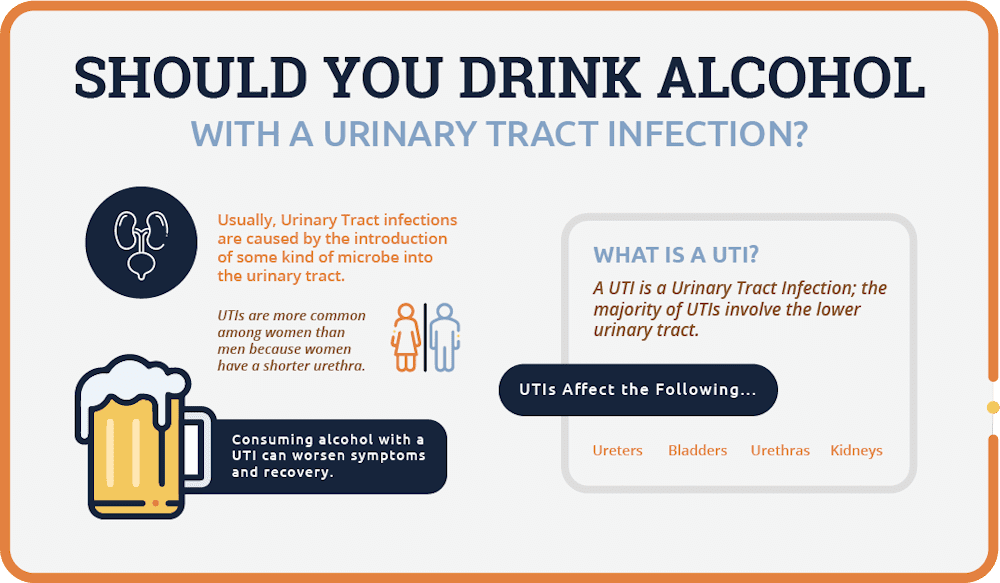 Everyone gets sick or experiences an infection at some point in their life. One extremely common infection that people go through is a Urinary Tract Infection (UTI). The majority of UTIs involve the lower urinary tract, such as the urethra and the bladder. While these infections are usually easily resolved, they can be annoying and painful.
Everyone gets sick or experiences an infection at some point in their life. One extremely common infection that people go through is a Urinary Tract Infection (UTI). The majority of UTIs involve the lower urinary tract, such as the urethra and the bladder. While these infections are usually easily resolved, they can be annoying and painful.
Despite how simple it is to treat a UTI, they can lead to serious conditions. For example, if the infection spreads to the kidneys, serious consequences can occur. Another way that UTIs may cause medical complications has to do with mixing certain medications used to treat UTIs. Nitrofurantoin and alcohol, for instance, should never be mixed together. Macrobid and alcohol use is also never recommended.
In this blog, we’ll break down what a UTI is. We’ll also cover if you can mix medications like nitrofurantoin and alcohol. Lastly, we’ll focus on topics such as what happens when you mix alcohol and Macrobid or how an Illinois alcohol rehab can help with you with your drinking problems.

What Is A UTI?
First, a UTI, is an infection that affects the following areas of the urinary tract such as:
- Ureters
- Bladder
- Urethra
- Kidneys
Usually, these infections are caused by the introduction of some kind of microbe into the urinary tract. Unfortunately, these infections are more common amongst women. This is because women generally have a shorter urethra than men do. Overall, there is a lot to know about UTIs. The following information will provide a basic understanding of UTIs, and eventually, whether or not mixing nitrofurantoin and alcohol is advisable when you have a UTI.
What Are the Symptoms of a UTI?
The tricky part about many UTIs is that this type of infection doesn’t always present visible symptoms. Often, UTIs can be overlooked or mistaken for other conditions. This is especially common in older adults. Additionally, even though it is more likely for this infection to occur in females, it can happen to males as well.
It’s important to know the symptoms of UTIs if you suspect you may have one. The symptoms will normally present themselves in the following ways:
- Cloudy urine
- Urine that contains blood
- Urine that has a strong smell
- Pelvic pain, especially for women
- A sensation of burning while urinating
- Only passing a small amount of urine when urinating
- Urine that is abnormal in color: bright pink, brown, red
- A strong urge to urinate that does not go away after using the bathroom
What Are the Causes of a UTI?
UTIs develop when bacteria enter the urinary tract through the urethra and begin to multiply in the bladder. The urinary system is designed to exclude microscopic invaders, but the defense of the urinary system can indeed fail. Once that occurs, bacteria latch on and grow into a full-scale infection.
If you’re in recovery from alcohol addiction, it’s essential to avoid alcohol. Dehydration from consuming too much alcohol can contribute to the development of a UTI, but will also not directly cause one. Other factors that can encourage the growth of bacteria, leading to a UTI, are:
- Not drinking enough fluids
- Purposely holding in urine for long periods
- Spinal cord injuries or other nerve damage that makes the bladder difficult to empty regularly and completely
- Conditions or situations that block the flow of urine, such as a tumor, kidney stone, enlarged prostate, or sexual intercourse
- Diabetes and other conditions that reduce the ability of the body’s immune system to fight off infection
- Catheters (tubes placed in the urethra and bladder to drain urine)
- Hormonal changes in the urinary tract of pregnant women make it easier for bacteria to spread through the ureters and to the kidneys
It is essential to avoid alcohol but necessary to remember that alcohol does not cause these types of infections. If you’re currently taking nitrofurantoin and alcohol consumption has occurred, you can rest assured that there will be no adverse effects. This is because mixing Macrobid or nitrofurantoin and alcohol does not cause negative side effects. However, it is still not advised to drink alcohol while on any medication as it can reduce the efficacy of the medication.
Infection of the Bladder (Cystitis)
Escherichia coli (E. coli) can cause UTIs. E. coli is a type of bacteria found in the gastrointestinal (GI) tract commonly. Other bacteria can be responsible.
Even though it is likely that sexual activity can cause cystitis, a person doesn’t have to be sexually active to develop it. Concerningly, studies suggest that every woman is at risk for cystitis due to their anatomy. There is a minuscule distance from the urethra to the anus and even the urethral opening to the bladder. However, UTIs can be avoided through good personal hygiene practices.
Infection of the Urethra (Urethritis)
When GI bacteria spread from the anus to the urethra, the above type of UTI can occur. Due to the female urethra being adjacent to the vagina, urethritis can also be caused by Sexually Transmitted Diseases and Infections (STDs and STIs), such as:
- Gonorrhea
- Herpes
- Mycoplasma
- Chlamydia
What Are the Different Medications You Can Take To Treat a UTI?
Nitrofurantoin
 Nitrofurantoin is commonly used to treat UTIs. It is an antibiotic that is usually prescribed for kidney infections and to treat cystitis. Nitrofurantoin works by causing the body to filter it out of the blood and into the pee as the individual urinates. The most useful aspect of this medication is its ability to become highly concentrated at the site of the urinary tract infection. The downside of the approach is that nitrofurantoin will not work for any other infection.
Nitrofurantoin is commonly used to treat UTIs. It is an antibiotic that is usually prescribed for kidney infections and to treat cystitis. Nitrofurantoin works by causing the body to filter it out of the blood and into the pee as the individual urinates. The most useful aspect of this medication is its ability to become highly concentrated at the site of the urinary tract infection. The downside of the approach is that nitrofurantoin will not work for any other infection.
The drug is available through prescription and in the following forms:
- Tablets
- Capsules
- Liquid
Common Side Effects of Nitrofurantoin
- Headaches
- Loss of appetite
- Feeling sick (nausea)
- Dizziness or feeling sleepy
- Being sick (vomiting and diarrhea)
There are some essential key factors to remember when taking this medication:
- An individual taking this medication will feel better in a couple of days
- Nitrofurantoin and alcohol can be mixed without serious consequences
- Nitrofurantoin’s most common side effect is an upset stomach, so it’s important to take this medication with food or after eating food to avoid stomach aches
Additionally, it’s important to remember that this drug can turn an individual’s urine dark yellow or brown. It is extremely normal, and the urine will return to its normal color once the individual has completed the course of treatment.
Macrobid
Macrobid is often prescribed to treat bladder infections. However, it can also be used to treat acute cystitis. The medication works by stopping the growth of bacteria. Subsequently, this means that this medication is useful for treating bacterial infections and not viral ones.
There is some concern over Macrobid and alcohol use. You may be wondering what happens when you mix alcohol and Macrobid. When it comes to Macrobid and alcohol use, medical professionals recommend the two not be mixed. This is because alcohol can cause severe dehydration, worsening a UTI.
Common Side Effects of Macrobid
- Nausea
- Headache
- Dark yellow or brown urine
A doctor should be notified right away if serious side effects occur while using this drug. Additionally, alcohol can cause the side effects of Macrobid to become worse. Subsequently, an individual should seek medical attention if very serious side effects occur.
Should You Mix Nitrofurantoin and Alcohol?
As a rule, it is always best to avoid drinking alcohol while experiencing a urinary tract infection. Further, mixing nitrofurantoin and alcohol could cause the antibiotic to become less effective. Therefore, the most effective route to take would be consuming a large amount of water to flush out bacteria from the urinary tract and bladder. The urinary tract must be flushed out in a timely manner to avoid serious medical consequences.
On the other hand, there are also many reasons not to consume any type of alcohol while taking Macrobid. The controversy that lies with Macrobid and alcohol use stems from the myth that combining the two can result in ineffectiveness. Studies suggest that medical professionals and doctors agree that consuming alcohol while taking Macrobid will not render the medication completely ineffective. The following side effects are worsened by alcohol to the point of being dangerous:
- Nausea
- Vomiting
- Dizziness
- Headache
- Dehydration
The truth is drinking alcohol while having a bacterial infection diminishes the individual’s body’s ability to effectively fight the infection. When an individual is undergoing an infection of any kind, proper rest and nutrition are the key essentials to successfully recovering.

Get Help For Alcohol Addiction at Northern Illinois Recovery
If you or a loved one is suffering from an addiction of any kind, whether it be a substance addiction or a behavioral addiction, contact us today.
Why You Shouldn’t Drink Alcohol When Taking Antibiotics
Alcohol interrupts the body’s healing process. Drinking also excessively interferes with sleep patterns, and if the individual struggling with a UTI doesn’t receive quality rest, they could be fighting the infection longer than necessary. While you should avoid mixing nitrofurantoin and alcohol, getting a professional opinion can be helpful when deciding if you can still have a drink.
The best route to take when deciding whether or not to consume alcohol while taking nitrofurantoin or Macrobid would be to discuss matters over with a doctor or medical professional. Your doctor’s decision will be based on individual medical history and medications currently being taken. For example, if someone inquires about consuming alcohol while undergoing liver problems and taking Macrobid, the doctor will say no to this combination.
What Other Drinks Should Be Avoided While Experiencing A UTI?
It is highly suggested that you avoid alcohol if you have a UTI. While the patient is undergoing treatment, the doctor will most likely recommend consuming plenty of fluids to continue assisting the body in flushing out the infection altogether. There are a few different fluids that can prolong the infection and cause further bladder irritation.
You should avoid the following drinks when undergoing treatment for a UTI:
- Tea
- Soda
- Coffee
- Caffeine
- Certain foods like chocolate, spicy foods, and tomato-based foods
- Citrus fruits such as grapefruit, oranges, and lemon can worsen UTI symptoms
- Citrus fruit juices such as orange juice and grapefruit because they irritate the bladder
While coffee and tea appear on this list, they can still be consumed under certain conditions. Only decaffeinated coffee or tea should be consumed when you have a UTI. This is because the caffeine in these drinks acts as a diuretic. Therefore, these beverages increase urination urgency. Chocolate also contains caffeine, so it will increase the frequency and urgency of urination. You should also avoid tomato-based foods and spicy foods. These contain ingredients that can very well irritate the bladder lining.
Recovering from Alcohol Addiction with Northern Illinois Recovery Center

Our main goal at Northern Illinois Recovery Center is to meet every person where they are in their recovery journey. We understand the importance of personal needs being met. We also understand the value of long-lasting stability and sobriety. If you or someone you may know is experiencing an alcoholic relapse or addiction, give us a call today.
Treatment Programs for Substance Abuse
Stopping drug or alcohol use can cause withdrawal symptoms that range from uncomfortable to potentially life-threatening. Regardless of the severity of symptoms, our experienced medical staff will ensure your safety while making you as comfortable as possible. Due to the potential dangers of withdrawal, we do not recommend self-detox. If you are looking to stop the use of substances, our detox program will provide emotional and physical support and address any medical complications that may arise.




